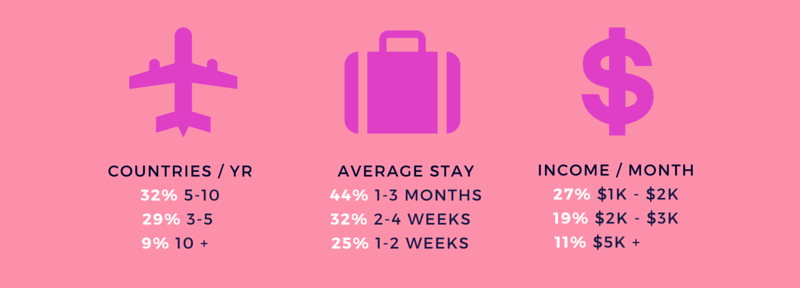Nomadic Lifestyle: The 9 Pros And Cons
In recent years, there has been a growing trend of people embracing the nomadic lifestyle. According to digital nomad statistics, there are over 35-40 million digital nomads all over the world for the past few years.
More and more people are choosing the nomadic lifestyle. For some, the appeal is the opportunity to see the world, enjoy life, and experience new cultures. For others, it is the freedom and flexibility that comes with not being tied down to one place.
But what are the pros and cons of this type of lifestyle? In this article, we will go over some pros and cons of nomadic living.
The Pros of a Nomadic Lifestyle
Freedom and flexibility
One of the biggest perks of leading a nomadic lifestyle is the unparalleled freedom it provides. If you’ve ever wanted to or fantasized about picking up and traveling the world, this may be the life path for you.
For some people, being able to immerse themselves in new cultures and work at their own pace while getting rest is ideal. In fact, the Digital nomad statistics show that 68% of people prefer this lifestyle because it offers more freedom and flexibility than the traditional 9-5 office job setting.
Cost-effective
Another benefit of nomadic life is that it can be a lot cheaper than traditional living arrangements. If you are constantly on the move, you don’t have to worry about things like paying rent, mortgage, utilities, health insurance, or other monthly expenses.
Just a practical tip, you can reduce your costs by staying in hostels, using Couchsurfing services, or even camping out when necessary. For example, in Thailand, you can get by at just $1,000 per month.
However, if you want to live the digital nomad lifestyle comfortably, keep in mind that the average monthly cost is $1875 per person. Of course, this all depends on your personal lifestyle and spending habits.
But if you can live a minimalistic lifestyle, you can save money by being a nomad.
Opportunities to meet new people
Nomadic lifestyles open some opportunities to meet new and interesting people from all over the world. Regardless of whether you’re working on your own business, exploring new places, where you are staying or how long you plan to stay there, every new place brings with it the chance to meet someone new and make a friend for life.
Several online communities could help you get in touch and stay connected with other nomads in your area. For example, the website “Nomad Network” helps you connect with other digital nomads in your city.
Once you find someone, you can chat with them online or even meet up in person to explore the area together. So If you are the type of person who enjoys meeting new people and making friends, then a nomadic lifestyle is definitely for you.
Get out of your comfort zone
Most of us get stuck in our comfort zones at some point in our lives. But sometimes, staying in our comfort zone can stunt our personal growth and one of the best things about a nomad life is that it forces you to step out of your comfort zone and make you try more new things.
You can attend new places, meet new people, and even do things that you never thought you would do. While it may be scary at first, stepping out of your comfort zone can help you grow as a person and this can help build your confidence and make you more resilient in the face of change.
Being able to work on things that interest you
Since you have the freedom to work on whatever you want, being a digital nomad allows you to pursue your passions and turn them into a career. If you’ve ever dreamed of writing a book, starting your own business, or working as a freelancer, being a digital nomad makes it possible to do all of those things.
You can work on your projects during the day and then go explore the city you’re in at night.
According to the statistics compiled by digital nomads, the most common fields of employment in the modern era are information technology (19%), creative services (10%), education (9%), consulting, coaching, and research (8%), sales marketing and public relations (8%), and finally finance and accounting (8%). Oftentimes, digital nomads are able to find work that is related to their field of interest and this makes the work more enjoyable.
The Cons of a Nomadic Lifestyle
Lack of stability
Some people may not realize that digital nomads who live in foreign countries can earn a lot of money in just a few months or weeks. Studies conducted by FlexJobs indicate that one in every five digital nomads brings in an annual income of between $50,000 and $99 000.
In addition, the average hourly wage for employees who work remotely may range from $10 to $30 or more within a few weeks. This means that digital nomads who live in different foreign countries earn more money than those who stay stationary.
But it is not always as great as it seems. One of the main problems with this nomadic lifestyle is that it can be very unstable. You could be paid one day and then not again for weeks, or even months. This happens because your potential clients can be from anywhere in the world.
Also, if you are used to having a set schedule and routine, this can be tough to adjust to. There may also be times when you feel isolated or lonely because you don’t have any close friends or family members nearby.
It can be tough to hold down a job
Another challenge of digital nomadic life is holding down a job. Because digital nomads are often location-independent, it can be difficult to maintain the stability that employers often require.
In addition, digital nomads may not have access to the same resources as their traditional counterparts, making it difficult to stay up-to-date on industry news or complete tasks in a timely manner.
Furthermore, because digital nomads often travel to different time zones, it can be challenging to coordinate work schedules with team members who are in different parts of the world.
As a result, those who choose to pursue digital nomadic life may need to be more flexible and adaptable in their approach to work. However, for those who are able to successfully navigate these challenges, digital nomadic life can offer a unique and rewarding experience.
It’s not always easy (or cheap) to travel:
While some people view traveling as an adventure, others find it stressful and exhausting – especially if they are doing it on a tight budget.
That’s why some digital nomads do not spend their entire lives on the go. According to the data on the digital nomad survey from Welance, the majority of people do not live an entirely nomadic lifestyle.

The majority of working travelers stay anywhere from 1-3 or even 6 months in each location. In addition, just 9 percent of individuals travel to more than 10 countries in the span of a year.
These findings illustrate that the digital nomadic lifestyle is not a feasible long-term solution for most people.
You may miss out on important life events
One final drawback of living a nomadic lifestyle is that friends and family members back home may start to feel like they’re always chasing after you just to spend time with you – and they may eventually stop trying altogether.
This means you could miss out on key life events such as births, weddings, graduations, etc., which can create feelings of guilt or regret later on down the road. While digital nomads may enjoy a high degree of freedom, they also need to be mindful of the potential drawbacks of their chosen lifestyle.
Conclusion
Living a nomadic lifestyle has its pros and cons. On the one hand, you have the freedom to travel wherever you want, when you want. You’re also able to work from anywhere in the world, which can be both convenient and challenging depending on your job.
On the other hand, living a nomadic lifestyle can be expensive, stressful, and isolating. You may miss out on important life events or find it difficult to maintain stable employment.
Given all of these considerations, it’s important for those considering a nomadic lifestyle to weigh the pros and cons carefully before making a decision. Ultimately, only you can decide whether this type of lifestyle is right for you.



